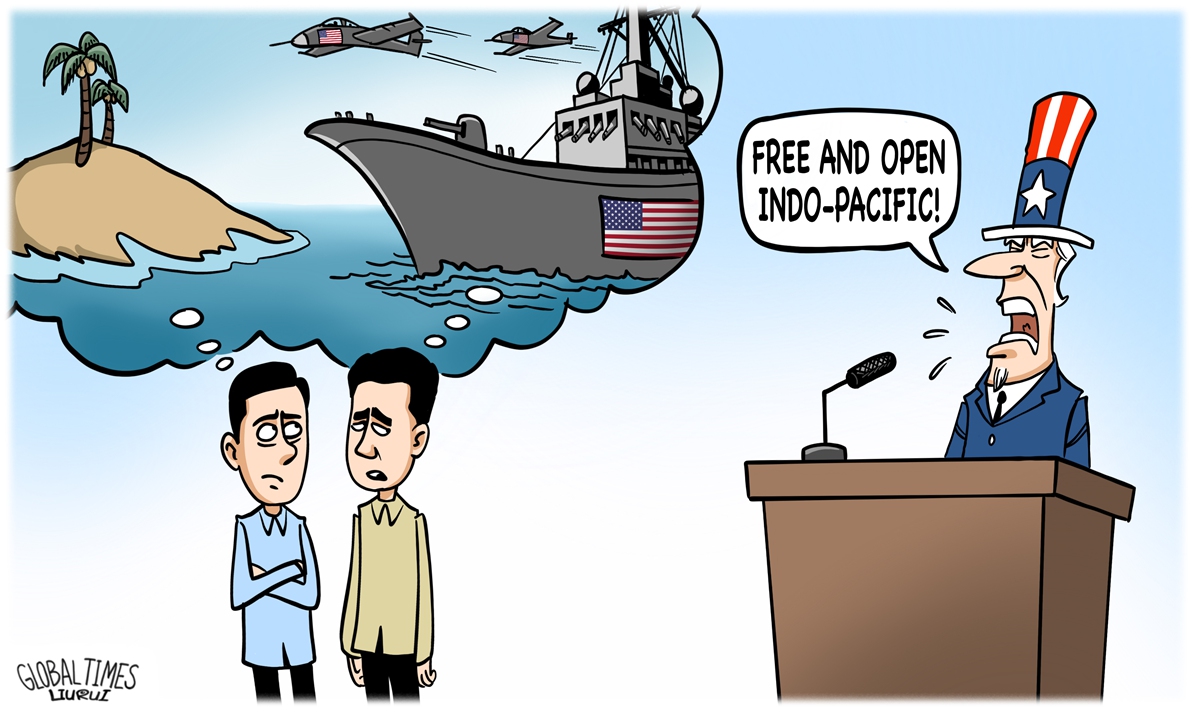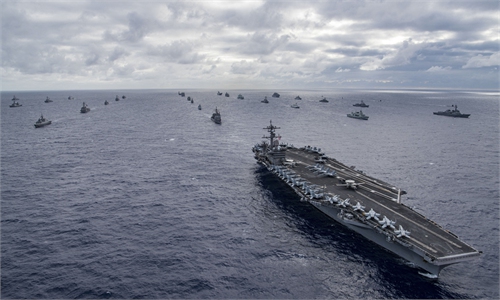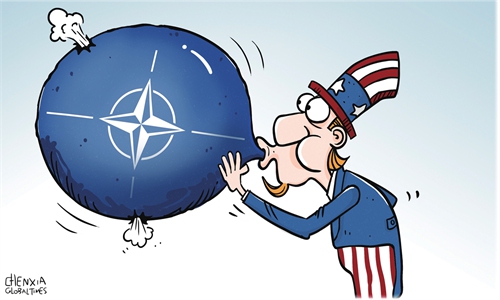To safeguard security in the Asia-Pacific, nations must guard against 'giant infant' US: Global Times editorial

Illustration: Liu Rui/GT
The US Ronald Reagan carrier strike group entered the South China Sea on Wednesday. Earlier that day, the guided-missile destroyer USS Benfold was driven away for illegally trespassing into China's territorial waters off Xisha Islands. On the other side of the Pacific Ocean, more than 30 ships and 170 warplanes are participating in the US-led RIMPAC 2022 exercise. And down in the south, two US Air Force B-2 Spirit stealth bombers were deployed to Australia for a "special mission." The military presence of the US and its allies has almost filled up the Pacific Ocean region, but Washington still claims to be committed to maintaining a "free and open" Indo-Pacific region.An inescapable reality is that the Asia-Pacific region is slipping from a model for world peace and development to an increasingly apparent security dilemma. Many regional countries, including ASEAN members, have repeatedly expressed such concerns. And while the US has paid lip service to appease this disquiet, it has actually set off a new round of arms race in the Asia-Pacific region. The Global Times previously reported that the US and Japanese militaries had conspired several times to deploy intermediate-range ballistic missiles on Japan's southwest islands. In addition, Washington has been urging Seoul to accelerate the normalization of the THHAD base as soon as possible.
These are some of the enormous efforts made by the US military to strengthen a Cold War-like pattern, which has led to a trend of military alliance formation in the Asia-Pacific. Like a sharp blade, this trend is slicing the big picture of joint development in the Asia-Pacific region. We can see clearly now what terrible consequences lie at the end of this route. Washington is using its alliance system to keep sharpening its spear, forcing non-US allies to upgrade their shields. This is not a good sign.
The Asia-Pacific region is in danger of falling into a security dilemma, and the root cause is the wrong security concept of the US. Washington's "security" is extremely selfish. It only seeks its own absolute security, disregards the legitimate security concerns of other countries, and lacks a sense of rules and moral restraint. This distorted security concept is seriously detached from the world's current reality. The US, the "big guy", is actually a "giant infant" in terms of security mentality.
From the deserts of Iraq to the mountains of Afghanistan, the "giant infant" mentality of the US pursuing absolute security has not brought absolute security to itself, but has left one mess after another around the world. Now, with this mentality, Washington has set its sights on the Asia-Pacific region. In this regard, we would like to make the strongest call. The inertia and potential momentum in this dangerous direction is rising, and countries in the Asia-Pacific region must break out of its orbit.
The Asia-Pacific is our common homeland, and protecting it is not only a responsibility, but also relates to our shared future. Although it is being greatly disrupted and destroyed, the forces of peace and development in the region can still overwhelm the forces that try to create division, confrontation and turmoil. The key to the future lies in what choices we make today. What needs to be recognized is that once any region is in a security dilemma, it is like being trapped in swamp. The harder you push, the deeper you sink. The only solution is to walk around this pit and not let yourself be pulled in. This is a basic consensus that all countries in the region should maintain.
The real security must be common, comprehensive, cooperative and sustainable. The Global Security Initiative proposed by China is an effective solution to solve "security deficit." This issue is becoming more and more urgent today. We believe that it is necessary for Asia-Pacific countries to intensify dialogue on this topic, jointly oppose the behavior of a few countries provoking disputes in the Asia-Pacific region, and confirm their unanimous will that they have no intention of intensifying the arms race and pushing up the security dilemma. In addition, relevant negotiations on common security, such as the code of conduct in the South China Sea, need to be accelerated so that regional conflicts can be effectively resolved within the region.
In the eyes of most people, the security concept of the US is immature and extremely dangerous, and "absolute security" is the "pacifier" that the US has not yet got rid of. Of course, we hope that the US can establish a correct view of security, but we cannot pin Asia-Pacific security on the hope that the US takes a mature approach, just like one cannot put all our eggs in one basket. At present, there are people who want to fracture the dam of Asia-Pacific security, all countries in the region should work together to strengthen the dam, and prevent unleashing a dangerous flood of volatility.


